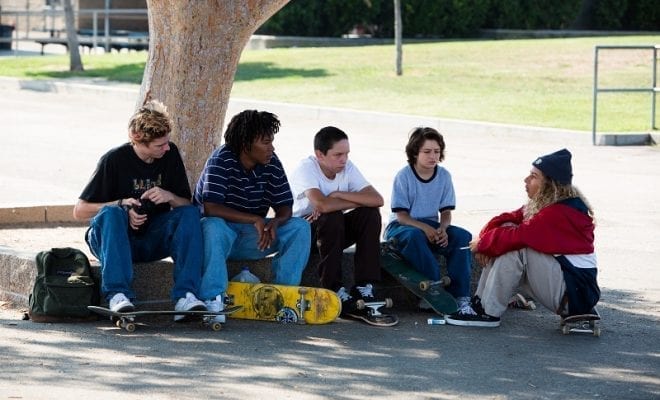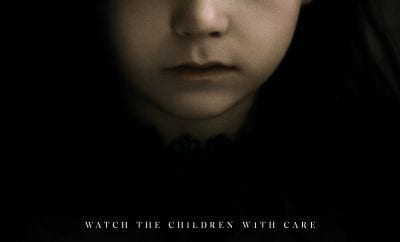 Mid 90s Photo Credit: Tobin Yelland
Mid 90s Photo Credit: Tobin Yelland
Movies
Reviews for Oscar Season
With awards season right around the bend, Cineplexes begin to start filling their screens with the years best films. For lovers of film, it isn’t just Christmas December 25th, it’s Christmas starting mid-October—this year we kicked things off with “A Star Is Born”— all the way through the end of the year! It’s a time we look forward to as we drudge through the early month throwaways, summer blockbusters, August and September studio failures, looking for gems along the way. Thankfully, I have just seen three gems that remind audiences why they love adventuring to the movies. With “Green Book”, “The Favourite”, and “Mid 90’s”, we see three very different films, all brilliant, and all three are bound to make awards season noise (thanks to festivals, they already are). Without further ado, here are our Oscar-worthy reviews!
Green Book
 By 2018 we have seen so many middle-of-the-road road movies that you might have wished the genre would just run out of gas. But having just left the wonderfully tender buddy comedy that is “Green Book”, I feel obliged to tell you that this offering is a soaring meditation of racial intolerance. A trite concept these days to be sure, especially for those who can recall the flowering warmth of “Driving Miss Daisy”, as Morgan Freeman took his inky Hudson Commodore off the racial beaten path. And yet, director Peter Farley (yes, the guy who did “Dumb and Dumber”) has remarkably revamped this leonine “based on a true story ” Oscar-bait into something fresh and exhilarating. The best feel good movie I have seen in years.
By 2018 we have seen so many middle-of-the-road road movies that you might have wished the genre would just run out of gas. But having just left the wonderfully tender buddy comedy that is “Green Book”, I feel obliged to tell you that this offering is a soaring meditation of racial intolerance. A trite concept these days to be sure, especially for those who can recall the flowering warmth of “Driving Miss Daisy”, as Morgan Freeman took his inky Hudson Commodore off the racial beaten path. And yet, director Peter Farley (yes, the guy who did “Dumb and Dumber”) has remarkably revamped this leonine “based on a true story ” Oscar-bait into something fresh and exhilarating. The best feel good movie I have seen in years.
The year is 1962, the place is the Bronx. The era is pre-integration, where “coloured” people had to visit separate restaurants and bathrooms; when they were foreigners in an ostensibly free land. It is quite risky for Farley to add a lighthearted breeze to such somber times. But he never lets his urgent topics get lost in the wind. Down wind from the stench of New York City’s trash epidemic–the meticulousness seen in the cars, buildings… hell, even the trash makes us feel present 55 years prior–is an Italian-American bouncer with a caring wife and kids in a stark neighborhood. Vigo Mortensen (excellent) put on thirty pounds to play this machismo-fueled tough guy. And it shows, with a plum shaped stomach that can cram 26 hotdogs in an eating contest–he is habitually running his mouth or filling it with food. But the movie begs the question, can he swallow his pride?
With a bruiser name like Tony Lip and a cogent understanding of the Italian alphabet (F*ckin A, F*ckin B, F*ckin C) you wouldn’t think he would take the back seat, well front seat, to African American musician Dr. Don Shirley (Mahershala Ali, brilliant). A sophisticated pianist who can speak as eloquently as he plays and much of the comedy’s success comes from the antithesis in the two’s demeanor. Whereas much of the drama’s success comes from the twos colorable friendship.
It isn’t a spoiler to say Tony takes the job as Docs chauffeur. Riding a sumptuous turquoise Cadillac from concert to concert, fending off the racist police and malevolent anti-Semitic’s of the Jim Crow South with nothing but his weathered hands. The concerts seen here consolidate the movies haunting moments. As Doc plays Chopin–Ali is miraculously convincing– every note seems to linger in the air with the scent of Champagne that lingers from the glasses of the patricians he plays for. But even with such skill and ethical manner, the whites don’t accept him as equal. Nor do the blacks, who sneer at his pressed suites resting on confident broad shoulders. Where Farley seems to hit all the right notes is in a mutual respect the two grow along the way. It’s a film about acceptance and understanding, reminding audiences that to get along takes harmony.
The beauty of this movie is that it doesn’t pose to have all the answers, nor does it stay dreary for long. Principally, the movie invites us into a lively laid-back atmosphere where humor and humanity can overcome injustice. If the central question is “why can’t we all get along(?)”, then the film reminds us we can. Almost paradoxically, this crowd-pleaser is an answer in and of itself. As it will have theaters filled with people of all colors and backgrounds rejoicing over this lovely evocation of how human kindness can truly make America great again.
Rating: 5/5
The Favourite
 Greek director Yorgos Lanthimos–this is in English, even if at times he seems to channel ideas in a foreign dialect– is an animalistic auteur. But not in the way you might think. His sadistic satire is never barbaric, but rather opulent in design and bizarre in their affection for the effete. As he compares his human characters to, you guessed it, animals. If this is your first feature of Yorgos’, welcome aboard. If not, you have probably become quite accustomed to the subject of playful bestiality, not literally of course, though his 2015 masterpiece “The Lobster” looms as a possible exception.
Greek director Yorgos Lanthimos–this is in English, even if at times he seems to channel ideas in a foreign dialect– is an animalistic auteur. But not in the way you might think. His sadistic satire is never barbaric, but rather opulent in design and bizarre in their affection for the effete. As he compares his human characters to, you guessed it, animals. If this is your first feature of Yorgos’, welcome aboard. If not, you have probably become quite accustomed to the subject of playful bestiality, not literally of course, though his 2015 masterpiece “The Lobster” looms as a possible exception.
Here, Lanthimos has originated yet another exceptional work. A comedy of human errors that evokes human terror. In which a grandiose 18th Century period piece of endless wooden hallways with seeping light beneath carved hardly visible ceilings, estates grander than the owner’s egos, and dazzling baroque costumes become futile next to this uncomfortably intimate quest for acceptance. And who better to center an erotic thriller around than the unstable and unfit (literally overweight, but also a deadweight at work) Queen Anne. (Olivia Coleman plays the lonely klutz of a Queen with more layers than that under her flowing robes).
Instead of following the bigwig men, “The Favourite” coalesces two shrewd women jousting for the Queen’s acceptance. A one-upmanship game of survival that blends “All About Eve” and “Barry Lyndon” to devilishly amusing extremes. In one of the queen’s ears is the cunning Lady Sarah (Rachel Weisz). A viper with a hissing tongue and a glaring stare, using her escapades with the Queen to persuade her influence on the Spanish Succession happening over in Europe. Threatening her prior success is the servant Abigail (Emma Stone). A distant cousin of Sarah’s who been dragged through the mud–her father lost her gambling. But you wouldn’t know it from her wide glistening smile that brings a warmth to the bleak grey and black hues. What follows is an ironic play of virtue, in which three brilliant leads take the stage for gossip, blackmail, and lewd put-downs that aren’t used to gain Anne’s approval or riches, but simply to avoid rags.
I have a hunch that this will be Yorgo’s most profitable work to date. It certainly is his most accessible, which seems odd given how crass these posh bigots really are. But there is something to be said for the snowball tension that, like Vivaldi’s crescendo’s, orchestrates an ever upward feeling of dismay up until the abrupt climax. It has a thrilling way of forcing an audience into watching these hopeless sitting ducks and make it feel, dare I say, pleasant. You will smile at the expense of a prestigeless Queen and her legion of pet bunnies (a metaphor for her lack of fertility). Which is made all the more empyreal through Robbie Ryan’s grand wide-shot cinematography and fish-eye shots that manipulate the view of a rabbit. The Queen calls these petite mammals her “babies”, Sarah replies “love has its limits”. Yorgos continues to push this mediums limits, and for that, we love him.
Rating: 4.5/5
Mid 90s
Teenagers these days. With their blaring ostentatious rap and even loftier vocabulary, it’s as if they have no regard for their superiors anymore. For those of you who believe that – and believe me, I know your out there – then Jonah Hill’s “Mid 90’s” is the film you need to see. An honest look at the makings of prepubescent chutzpah through the observational lens of an impassioned artist. (Hill has admitted that the skateboarding hero is quasi-autobiographical). And by using real people, not actors–this is more in line with “The 400 Blows” or an Italian Neo-Realist film than Chevy commercials– it carries an almost documentary feel. Making the Sophomores sophomoric put downs feel, dare I say it, humane.

DAY 31 MID 90S Photo Credit Tobin Yelland
The human at risk here is 12-year-old Stevie (star in the making, Sunny Suljic). An innocent introvert in Los Angeles with a hooker for a mom (Katherine Waterson) and a big brother (Lucas Hedges, exceptional) that hits harder then the skateboard crashes seen throughout. It isn’t until he meets a group of foul-mouthed skaters–Ray, Rubin, “Fourth Grade”, and “Fuckshit”, all played startlingly well– that he opens up. And so do we. There is something magical that happens when Stevie lets out a sunny smile underneath his shaggy hair and curious eyes. Hill knows it and rolls with it. The result is pure bliss. A blend between the existential crisis of looking forward and that obscene flippant humor that takes you back. Of course, many, including the mother here aren’t too thrilled about this “live life for today” attitude. But by giving the four backstories of abuse and poverty, the board beneath their feet becomes a much-needed escape (the tricks are “dope”). The trick that the film pulls off is to remind the viewer of the importance of friendships and how they guide you through unguarded moments and shape you, while all-the-while never romanticizing the subject. The title and the aesthetic ooze 90s, but the ideas here are timeless.
4.5/5





0 comments